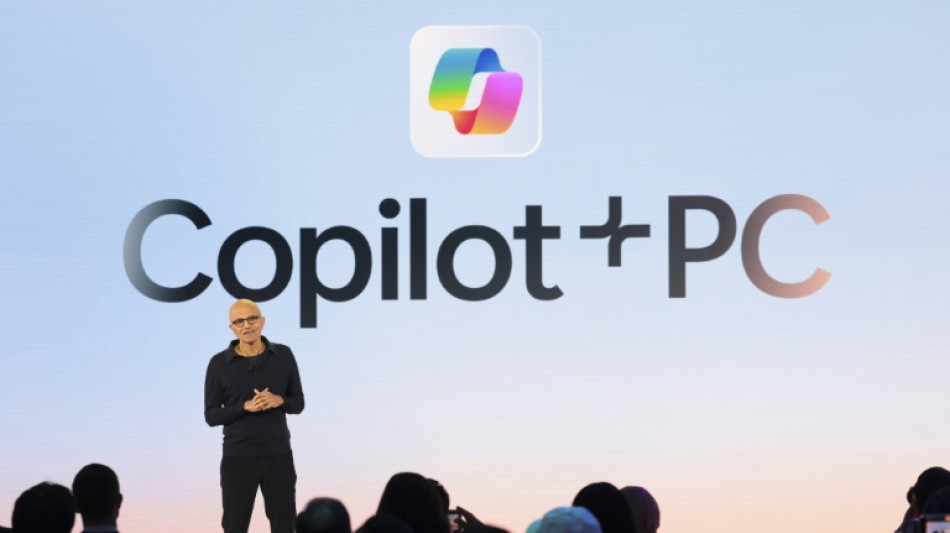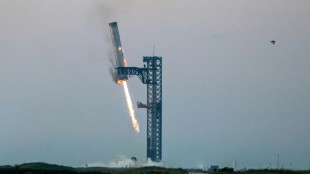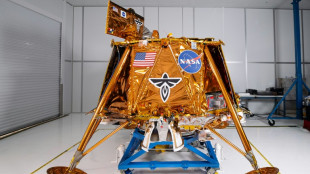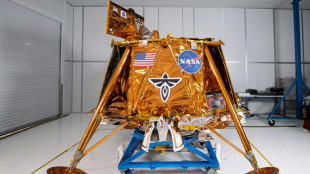

Microsoft unveils 'AI-ready' PCs
Microsoft CEO Satya Nadella unveiled a new category of PC on Monday that features generative artificial intelligence tools built directly into Windows, the company's world leading operating system.
The tech giant estimates that more than 50 million "AI PCs" will be sold over the next 12 months, given the appetite for devices powered by ChatGPT-style technology.
"We are introducing an entirely new class of Windows PCs engineered to unleash the power" of on-device AI, Nadella said at a launch event in Redmond, Washington.
"We call this new category 'Copilot Plus'...the fastest, most AI-ready Windows PCs ever built," he added.
Of all the tech giants, Microsoft has pushed the most aggressively to infuse the powers of generative AI into its products, often leaving rival Google to play catch-up.
ChatGPT-style AI, which is called Copilot at Microsoft, is available across the company's products, including Teams, Outlook and its Windows operating system.
Microsoft even tried, so far unsuccessfully, to rejuvenate Bing, its poor-performing online search engine, with generative AI powers.
"These improvements provide the most compelling reason to upgrade your PC in a long time," said Microsoft Vice President Yusuf Mehdi.
Microsoft said Copilot Plus PCs, built with powerful AI-ready chips, are 58 percent faster than the M3 MacBook Air.
Companies like Lenovo, Dell, Acer and HP said they would also release PCs that run on Microsoft's new Copilot Plus software.
Microsoft said that the AI features will take place on the device, so you won't have to wait for data to get sent to and from remote data-centers or pay for a subscription.
AI offerings will include live translation, image generation and a state-of-the-art ability to interact with your computer through chats and simple prompts instead of clicking on files or drop-down menus.
Microsoft's pivot to AI has been celebrated by Wall Street, and the company is now the world's biggest company by market capitalization, after dethroning Apple.
Microsoft is OpenAI's main investor and has injected some $13 billion in the form of cloud computing credits that fulfill the ChatGPT-maker's huge needs for computing.
In return, Microsoft depends on OpenAI's models -- such as GPT-4 for text or Dall-E for images -- to feed AI to its products.
Nadella's announcement on AI comes on the heels of those made by Google and ChatGPT-maker Open AI last week.
They showcased updates to their chatbots, with even more human-like interactions and new abilities to understand their surroundings via video.
Google also announced it was adding AI answers to its world-leading search engine, despite fears it may eat into its advertising revenues or starve web sites of traffic.
- 'AI revolution' -
Analysts believe that the hunger for AI products is helping buoy Microsoft and Google's cloud computing businesses, with clients ready to pay a premium to adopt ChatGPT-like capabilities.
In a note to clients, Wedbush Securities analyst Dan Ives said that AI will add $25 billion-$30 billion to Microsoft's sales by 2025.
"The spending on AI is unprecedented across the tech world and this is just the first phase of the AI Revolution playing out," Ives said.
Microsoft's injection of AI into PC's came just ahead of an Apple event next month that is widely expected to see ChatGPT's abilities feature in a new iPhone.
Media reports also suggest that Apple could announce a partnership between Apple and OpenAI.
The tech giants are racing the products out the door despite worries that generative AI poses a threat to society.
Authorities, including in the US, are drawing up ways to more closely track the developments in AI, and potentially put limits on its deployment.
R.Vandevelde--JdB



